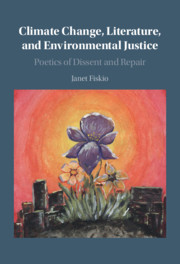Book contents
- Climate Change, Literature, and Environmental Justice
- Climate Change, Literature, and Environmental Justice
- Copyright page
- Dedication
- Contents
- Acknowledgments
- Introduction “A Fault Line of Pain”
- Chapter 1 “Fear of a Black Planet”
- Chapter 2 Ghosts and Reparations
- Chapter 3 Mapping and Memory
- Chapter 4 “Bodies Tell Stories”
- Chapter 5 Round Dance and Resistance
- Chapter 6 “Slow Insurrection”
- Chapter 7 Cannibal Spirits and Sacred Seeds
- Epilogue “Everyday Micro-utopias”
- Works Cited
- Index
Introduction - “A Fault Line of Pain”
Colonization, Enslavement, and the Futures of Climate Justice
Published online by Cambridge University Press: 13 April 2021
- Climate Change, Literature, and Environmental Justice
- Climate Change, Literature, and Environmental Justice
- Copyright page
- Dedication
- Contents
- Acknowledgments
- Introduction “A Fault Line of Pain”
- Chapter 1 “Fear of a Black Planet”
- Chapter 2 Ghosts and Reparations
- Chapter 3 Mapping and Memory
- Chapter 4 “Bodies Tell Stories”
- Chapter 5 Round Dance and Resistance
- Chapter 6 “Slow Insurrection”
- Chapter 7 Cannibal Spirits and Sacred Seeds
- Epilogue “Everyday Micro-utopias”
- Works Cited
- Index
Summary
The introduction places climate disruption within histories of colonization and enslavement. A reflection on the Equal Justice Initiative’s National Memorial for Peace and Justice frames the persistence of structures of enslavement and racial apartheid that are evident in the US landscape through both presence and absence. Proposing a reparative and decolonial approach to climate justice, the introduction draws on a range of perspectives, including environmental justice, decolonial theory, and Black agrarianism. In dialogue with expressive cultures and resistance movements of frontline communities, the introduction outlines the ways that utopian narratives can express a desire to be freed from the sins of the past. In response, this introductory chapter offers narratives of revolutionary pasts and dystopian futures; practices of mourning, dissent, and hospitality; and everyday inhabitation and social care as locations where better worlds are created.
Keywords
- Type
- Chapter
- Information
- Climate Change, Literature, and Environmental JusticePoetics of Dissent and Repair, pp. 1 - 20Publisher: Cambridge University PressPrint publication year: 2021

